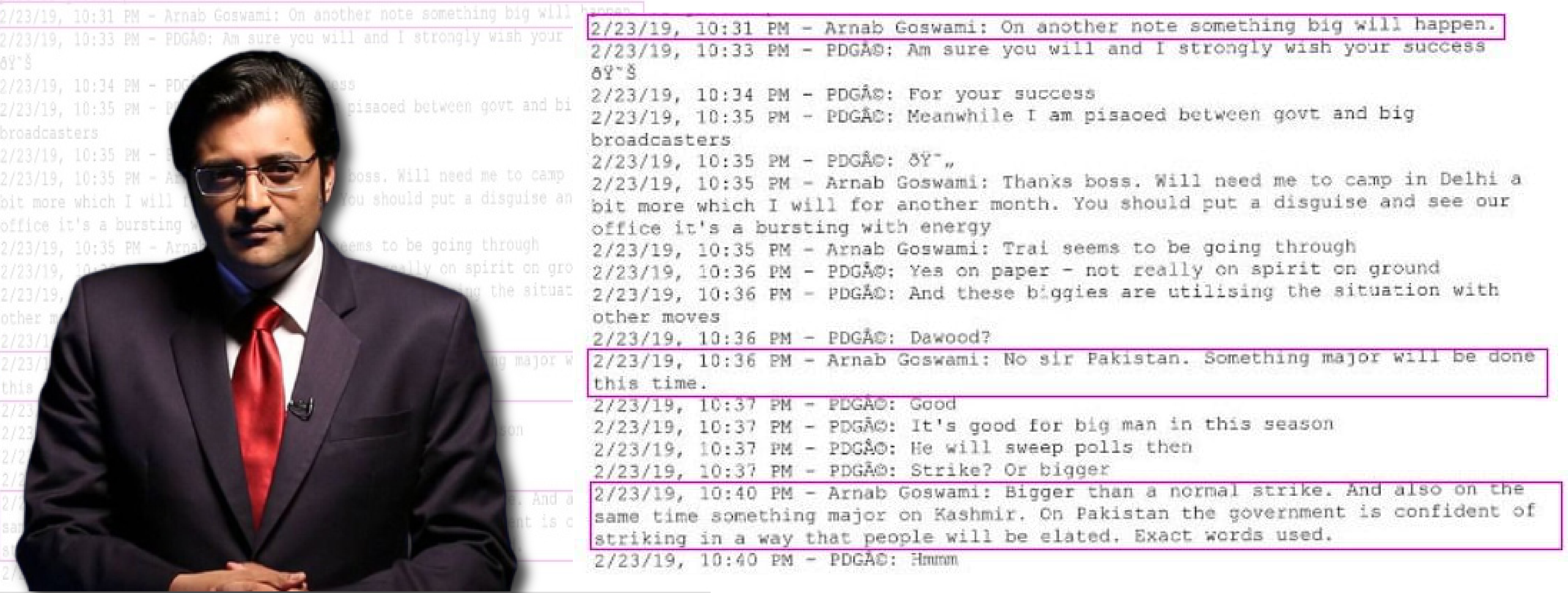

By Andrew Korybko, Moscow-based American political analyst
18 January 2021
Screenshots of Indian journalist Arnab Goswami’s WhatsApp chat with Broadcast Audience Research Council (BARC) CEO Partho Dasgupta from February 2019 were leaked to the media a few days ago. The images purport to prove that Goswami not only celebrated the 14 February Pulwama incident as “[an] attack we won like crazy”, but even had several days’ advance notice of India’s retaliatory strike against Pakistan in Balakot. In addition, Dasgupta is alleged to have claimed that “it’s good for big man in this season” and that “he will sweep polls then”. These startling revelations breathe fresh life into the speculation that the Pulwama incident might have been a false flag attack to justify the Balakot strike. They also expose India’s multisided Hybrid War.
Regarding the first matter of insight, it was extremely suspicious from the get-go that a lone individual was able to break through India’s totalitarian military regime in Indian Illegally Occupied Jammu & Kashmir to carry out a suicide car bombing attack that killed 40 Indian security personnel. Some observers, and including a few folks within India itself, wondered whether the authorities were aware of the attack in advance but allowed it to go through anyhow in order to serve as the pretext for launching their preplanned strike against Pakistan in order to boost Prime Minister Modi’s re-election campaign ahead of general elections that began in April. Goswami’s private glee in the immediate aftermath of that attack suggests that he knew more than he publicly let on.
This isn’t baseless speculation either since his subsequent messages confirm that he had inside information about what would come next. In Goswami’s own words according to the leaked screenshots, “Something major will be done this time”, which prompted Dasgupta to predict that it’ll ultimately be to Modi’s electoral advantage. Goswami then added that it’ll be “bigger than a normal strike”, “And also at the same time something major on Kashmir. On Pakistan the government is confident of striking in a way that people will be elated. Exact words used.” Obviously, someone or some people within India’s permanent military, intelligence, and/or diplomatic bureaucracies (“deep state”) passed these national security secrets along to Goswami.
The presumed purpose in doing so was to enable him to more effectively “manage perceptions” through the media in order to further improve Modi’s re-election prospects. Goswami is regarded as being among the country’s most passionate supporters of the ruling BJP outside of the government, a distinction which has also led to him being sharply criticized by many who believe that he functions more as its unofficial lobbyist than as an actual journalist. Considering the leading role that he plays in advancing the government’s agenda in the information sphere, it’s understandable why some members of the Indian “deep state” might have thought it useful to discretely brief him about the reality of what happened, what will come next, and how it’ll help Modi.
It’s unclear whether Goswami was aware that the Pulwama incident might have been a false flag attack, but he was unquestionably informed by trusted sources that the series of events that was set into motion would eventually serve Modi’s electoral interests, which Dasgupta instantly realized from his hints. Putting aside the credible speculation about what might have really happened in Pulwama, there’s no doubt that the Indian government is waging a multisided Hybrid War against Pakistan but also against its own citizens at home too. The Balakot strike didn’t have any military significance, but it crucially allowed the BJP to reshape the electoral campaign by diverting attention away from domestic socio-economic issues and towards national security.
In order to understand how this relates to the phenomenon of Hybrid War, this complex concept itself must be briefly explained. In short, Hybrid War refers to a wide variety of cunning actions below conventional military ones carried out for the purpose of regime tweaking, regime change, and regime reboot against the targeted government. These objectives correspond to pressuring them into carrying out political concessions, changing their leadership, and implementing far-reaching constitutional reforms. None of them have any relevance towards Pakistan or India in the examined context of the Pulwama and Balakot incidents, however, which is why an innovation to this theory needs to be introduced: regime reinforcement.
This refers to a wide variety of cunning actions below conventional military ones carried out for the purpose of supporting a certain government, usually the same one that’s doing whatever it is. These include positive information campaigns about the incumbent authorities, the use of Color Revolution’s political technologies to quickly generate pro-government crowds (usually to counter anti-government ones), and focused crowd-dispersal tactics that lead to minimal collateral damage, et al. In the examined context, the Pulwama and Balakot incidents serve the exact same purpose, especially the second-mentioned one considering the evidence that has emerged proving the military/intelligence-media nexus between the Indian “deep state” and Goswami.
To explain, whether or not the Indian security services had advance notice of the Pulwama attack, that event was immediately exploited as the pretext for carrying out the subsequent strike in Balakot which served no military significance but crucially allowed Modi to present himself as a national security champion. This in turn distracted from his socio-economic failings which threatened to derail his re-election bid a few months later. Members of the Indian “deep state” wanted to exploit internal and external security concerns for domestic political purposes, hence why they discretely briefed Goswami in detail about their master plan for managing perceptions in such a way as to ensure Modi’s re-election.
Pakistan was the state victim of India’s external Hybrid War tactic of launching a militarily insignificant but nevertheless symbolic strike against Balakot after Pulwama. The Indian people, meanwhile, were the non-state victims because they were manipulated into thinking that all of this was spontaneous and not preplanned to an unclear extent through Goswami’s and others’ perception management tactics as now convincingly seems to be the case in hindsight. None of this was carried out in pursuit of the traditional Hybrid War goals of regime tweaking, regime change, and regime reboot, but for the innovative one of regime reinforcement related to boosting Modi’s re-election prospects.
The disturbing conclusion is that India isn’t as pure of a democracy as it publicly presents itself as being for global soft power purposes. It never tires of accusing the Pakistani “deep state” of meddling in that country’s democracy, yet evidence has now suddenly emerged purporting to prove that it’s actually the Indian “deep state” that directly meddles in its own democracy. They allegedly did so by not only tipping one of the government’s favorite journalists off in detail about how the Pulwama incident and subsequent Balakot strike would serve Modi’s electoral interests so that he could then manipulate Indian voters in that direction, but perhaps by even passively facilitating the first-mentioned attack in order to serve as the pretext for the second.
Disclaimer: The views expressed in the article are of the author and do not necessarily represent the institute’s policy.
